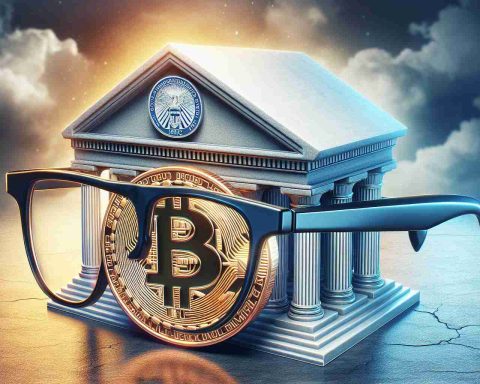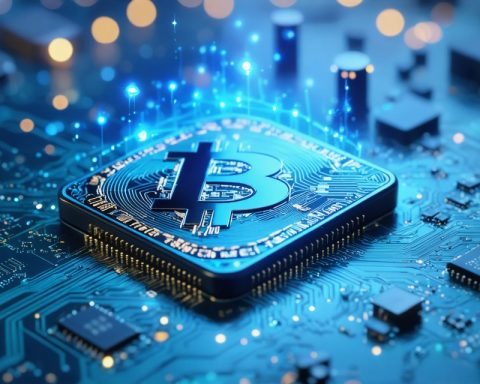The Ripple vs. SEC Case: A Paradigm Shift in Cryptocurrency Regulation?
The Ripple vs. SEC lawsuit isn’t just causing ripples in the crypto world; it’s potentially setting the stage for a monumental shift in how digital currencies are classified and regulated. This legal confrontation, centered around whether XRP should be treated as a security, could open the doors to new regulatory frameworks, fundamentally impacting the global cryptocurrency and blockchain markets.
Game-Changer for Blockchain Innovation
The outcome of this lawsuit holds the power to either bolster or burden the crypto industry with regulatory challenges. A ruling that XRP qualifies as a security could tighten compliance requirements, making it more difficult for new blockchain ventures to thrive under hefty regulatory pressure. However, a verdict in favor of Ripple could alleviate these concerns, catapulting innovation and investment across the crypto sector. Such an outcome might foster an environment conducive to the development of diverse digital financial products, potentially steering a wave of economic evolution.
A New Financial Order?
Ripple’s potential victory in this case could inspire an accelerated adoption of decentralized finance (DeFi) solutions. With DeFi platforms enabling cross-border transactions without intermediaries, traditional banking systems may find themselves re-examining their roles. This shift could democratize financial services, offering unprecedented access to those in underserved regions and narrowing economic inequality.
Regulation Meets Innovation
The Ripple vs. SEC legal battle underscores the delicate balance needed between regulation and technological advancement. New regulatory clarity is essential for enhancing consumer confidence and integrating digital solutions into mainstream finance. As this case progresses, it’s not merely a legal contest but a pivotal moment in redefining the future of finance—where innovation and regulation must harmoniously coexist.
The Ripple vs. SEC Case: Environmental Implications and Global Impact
The ongoing Ripple vs. SEC lawsuit serves as more than a landmark legal battle in the cryptocurrency sphere. It has the potential to redefine the framework for digital currencies, influencing not just the economy and financial innovation but also the broader environmental implications of blockchain technology. As cryptocurrency’s future hangs in the balance, this case highlights a possible shift towards sustainable practices in blockchain operations.
Environmental Considerations
Blockchain technology, including the Ripple network, offers more than just financial innovation; it presents opportunities to improve energy efficiency compared to traditional banking systems. XRP, Ripple’s native cryptocurrency, uses a consensus mechanism known as the “XRP Ledger,” which requires significantly less energy than the Proof of Work model utilized by Bitcoin and Ethereum. Should the Ripple vs. SEC case result in favorable conditions for Ripple, it could amplify the adoption of energy-efficient blockchain solutions, thereby reducing the environmental footprint associated with digital currency transactions.
A ruling that supports Ripple could catalyze an industry preference for technologies that improve transaction speed and decrease energy consumption. This shift has potential ramifications for environmental policies globally, encouraging innovations that align with renewable energy goals and sustainable practices. As lawmakers deliberate on the classifications and regulations for cryptocurrencies, incorporating environmental considerations could become central to nurturing an eco-conscious blockchain sector.
Global Implications for Humanity
Beyond environmental benefits, the outcome of the Ripple case can affect humanity on a global scale by transforming financial inclusivity. A regulatory framework conducive to Ripple’s vision could accelerate decentralized finance (DeFi) adoption, bridging financial gaps for billions of unbanked individuals worldwide. By eliminating the need for central intermediaries, DeFi platforms can offer secure, accessible financial services to people in economically marginalized regions, empowering them with tools for economic growth and stability.
This transition to decentralized systems might prompt traditional financial institutions to adapt, potentially leading to a more democratic and equitable global financial order. The ensuing democratization of financial services could contribute significantly to reducing worldwide economic disparities and fostering societal progress.
Economic Impact and Future Prospects
The economic ramifications of the Ripple vs. SEC decision extend well beyond legal parameters. An innovative regulatory environment could unleash a wave of investments into blockchain capabilities, perpetuating a new era of financial products and services. These advancements might touch various industries, reshaping markets, and fueling economic evolution.
As humanity steps into the future, the integration of regulation with technological advancement, as demonstrated in this legal case, reveals the intricate balance necessary for sustainable growth. When innovation is thoughtfully regulated, it catalyzes not just economic expansion but also propels environmental stewardship and social equity, laying the groundwork for a future where technology enhances the quality of life for all.
Ripple vs. SEC: Could This Legal Battle Define the Future of Crypto Regulations?
Emerging Trends in Crypto Regulation
The Ripple vs. SEC case has spotlighted the ongoing debates about how digital currencies should be regulated globally. As more countries observe the outcome, they may develop their own regulatory frameworks, inspired by U.S. precedents. This could lead to a more harmonized global regulatory environment, which might make international transactions more seamless for businesses and consumers.
Pros and Cons of Potential Outcomes
There are significant implications to consider based on the potential outcomes of the Ripple vs. SEC case:
– Pros of XRP Being a Security:
– Could provide clear guidelines for other cryptocurrencies, encouraging legal compliance.
– May increase investor confidence due to enhanced regulatory oversight.
– Cons of XRP Being a Security:
– Could stifle blockchain innovation under stringent regulatory compliance.
– Might deter new entrants and smaller startups from venturing into the crypto space.
Innovations Spurred by Regulatory Challenges
In the face of potential regulatory shifts, blockchain companies may innovate by developing more robust systems that naturally comply with possible new regulations. Innovations could include advanced blockchain technologies that integrate compliance features, such as automated reporting and audit capabilities, without compromising on decentralization or privacy.
Market Analysis: A Precursor for DeFi Expansion
A Ripple victory might trigger a boom in the DeFi market, encouraging innovation and attracting significant investment worldwide. This could transform financial markets by integrating tokenized assets, smart contracts, and decentralized trading solutions. The case might also inspire traditional financial entities to adopt blockchain technology more aggressively, seeking to modernize their platforms and remain competitive.
Security and Sustainability Insights
The regulatory clarity that might emerge from the Ripple case could also spotlight security and sustainability in blockchain technology:
– Security Aspects: Regulators may set higher standards for cybersecurity within the crypto realm, protecting consumers from potential fraud and hacking incidents.
– Sustainability: Environmentally friendly practices might be incentivized, pushing companies to adopt greener blockchain solutions, such as proof-of-stake, which require less energy than traditional proof-of-work systems.
Predictions for the Global Crypto Industry
As the case unfolds, experts predict that the global crypto industry could see significant changes. If Ripple prevails, it might embolden other companies facing similar lawsuits to stand their ground, potentially leading to a reexamination of existing regulations. Conversely, a ruling against Ripple could prompt the industry to rally for clearer, more accommodating regulatory frameworks.
For more insights into the evolving blockchain landscape, visit Ripple and SEC.











